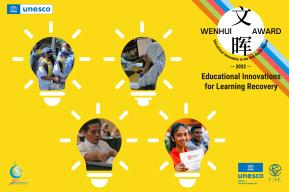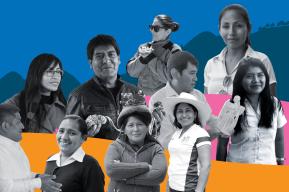Samantha, aged 9 from Lima, Peru, was selected to attend this year’s science programme run by UNESCO Prize for Girls’ and Women’s Education laureate, the Mini Academy of Science and Technology, or MaCTec.
When Peru announced that schools would remain closed for the entire 2020 school year due to the severity of the COVID-19 pandemic in the region, MaCTec needed to rapidly rethink the delivery of their extra-curricular science programme for girls aged 8 to 11.
Engaging girls online
As MaCTec’s President, Johanna Johnson explains, a key concern when lockdown was announced was whether all 40 girls selected to attend this year’s programme, due to begin the following week, would be able to access the workshops if they were held online.
“Only 6% of homes in remote areas of Peru have an internet connection, compared to 40% in urban areas and 60% in Lima”, said Johanna based on data from Peru’s Instituto Nacional de Estadística e Informática (National Institute of Statistics and Informatics). “We were extremely fortunate that all girls this year were still able to participate despite coming from a variety of socio-economic backgrounds.”
As MaCTec adopted the online meeting platform Zoom, Global Education Coalition partner, to deliver its programme, a priority was to adapt the pedagogy to ensure that girls would engage with and participate in experiments and learner-led discussions.
Scientists leading the workshops created activities and experiments using basic materials easily found at home and fostered group discussions during the Zoom calls. The discussions invited girls to ask questions about what they discovered during the experiments and to develop hypotheses for the next activity, building on what they had learned the week before.
Expanding learning beyond girls
Helping the girls make sense of the current situation, focusing on understanding COVID-19 and viruses more generally was an obvious place to start. So far, activities have ranged from building paper (water-drop) microscopes and examining the effects of COVID-19 on our respiratory systems through hands-on experiments.
Samantha enjoys learning via Zoom and connecting with other girls. “I really like learning more about the coronavirus”, said Samantha. “My mother always says it is important not to believe everything we hear and to always investigate and find out the truth.”
For Johanna, a key part of the workshop’s success online is the support and involvement of the girls’ families. Parents and siblings are encouraged to participate in the experiments and in Zoom lessons as a way to not only reinforce learning but to expand learning beyond the 40 girls.
“Science education has traditionally been weak in Peru and I’m so impressed by how keen parents are to learn alongside their daughters and to ask questions”, said Johanna. “We see this as such a positive outcome and are now reviewing how we can adapt our workshops and content to benefit not just girls but also their families.”
Seizing the opportunity to scale up
While the in-person workshops will remain a priority, MaCTec sees the current situation as a window of opportunity.
MaCTec is building on the initial success of the online workshops and is exploring how they can produce high quality material that can be made accessible both online and offline to expand their reach to more girls in Peru.
“By developing science-based activities and resources that are both gender transformative and accessible at any time, we hope to reach many more girls and their families, especially outside of Lima where there are fewer opportunities for girls to engage in science”, said Johanna.
She adds, “this crisis has made us more determined than ever to share our inquiry-driven educational model to empower all girls to become critical thinkers and learners who are confident in their abilities”.
***
At the peak of the pandemic, over 1.5 billion learners around the world have seen their education disrupted due to COVID-related school closures. Under UNESCO’s Global Education Coalition, a Gender Flagship was established to safeguard progress made on gender equality and education and promote girls’ and women’s empowerment in and through education.
The UNESCO Prize for Girls’ and Women’s Education was created in 2015 with funding from the Government of the People’s Republic of China. It honors outstanding and innovative contributions that advance girls’ and women’s education.
The Mini Academy of Science and Technology (MaCTec) is a laureate of the 2017 UNESCO Prize for Girls’ and Women’s Education. MaCTec empowers Peruvian girls through science workshops with established scientists where they can wonder, create and experiment, and then return home to their peers and community to share their experience and apply their learning.







